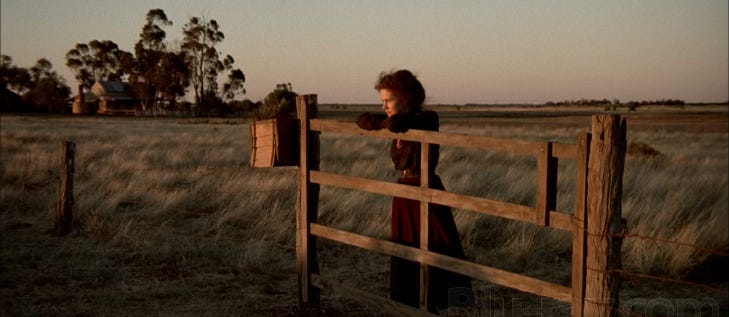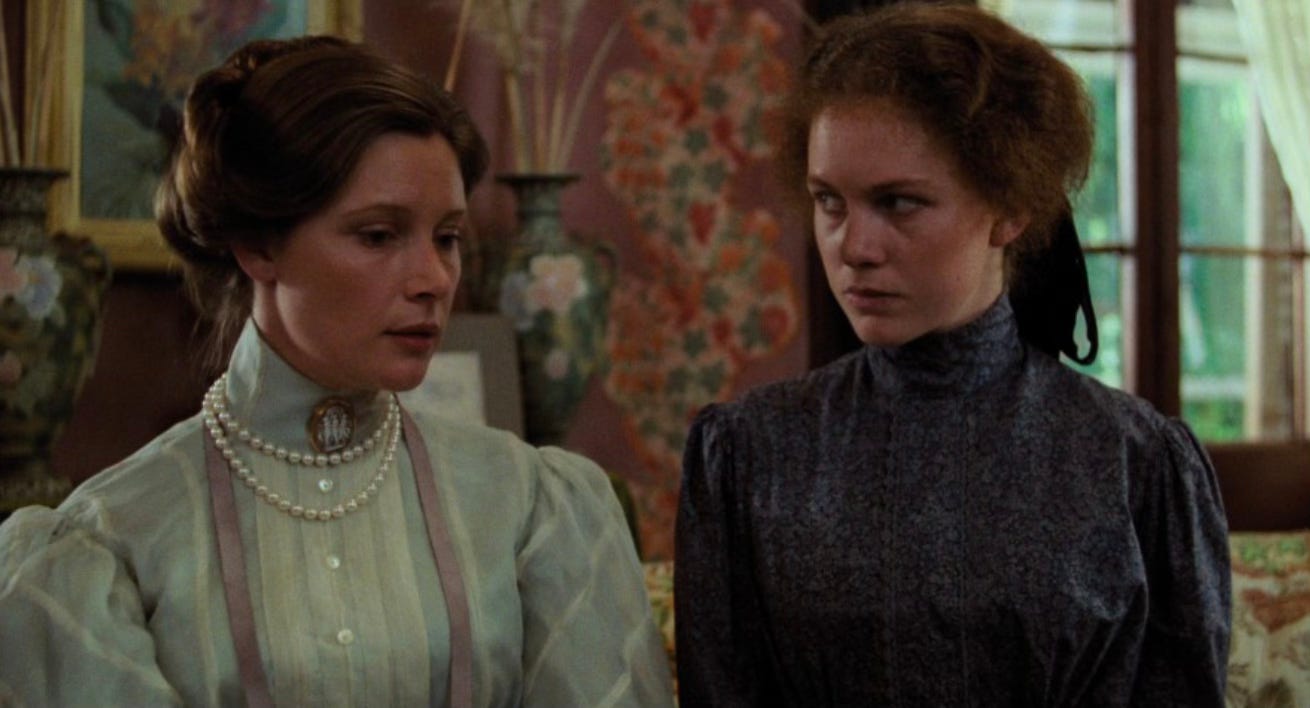“Loneliness is a terrible price to pay for independence”
The possibility of my creativity is worth fighting for
Last night, I went with
to see one of her favourite films in the cinema. A note about Zoë and our friendship - we met on that most niche of platforms, Livejournal, back in the early aughts. In real life, our connection was solidified as two lonely girls growing up in rural Ireland, whose lives were governed by what ever piece of world cinema was being shown on TnaG late at night on a Saturday / Sunday morning.Last night we watched My Brilliant Career, an Australian period-drama set in New South Wales in the late 1800s. Directed by Gillian Armstrong - who also directed 1994’s Little Women - this film took my breath away.
I had such a visceral, emotional, powerful reaction to this stunning work of art that poor Zoë had to hold my hand for the last forty minutes of the screening as tears monsooned down my face.
But this is what happens when you feel seen and validated by a piece of art.
There is a piece to be written about my love for Australian New Wave films - as an ardent Peter Weir fan, I did feel imprints of his 1975 Picnic at Hanging Rock all over My Brilliant Career.
I could write essays on the imageries and colours used in this film. When Sybylla throws a bunch of flowers (given to her by a limp would-be suitor) into the river, the colours and hazy lulling of the river generate such a romantic and yet hissing atmosphere, the film has its own scent.
Sybylla’s room in her ramshackle family home, decorated with images of those she admires, pinned pieces of lace adorning the walls, the starkness of her single bed juxtaposed by open windows letting the air in to the room to breathe.. oh, I could write for hours about the interior furnishings of women’s spaces as a reflection of their emotional and intellectual interiority. A Room of One’s Own!
“Loneliness is a terrible price to pay for independence.”
I’m going to write instead about the decision made by some women (including myself) to choose to reject heteronormative norms for possibility. When Sybylla turns down the beautiful, sweet, sensitive Harry Beecham’s (played by a magnificent Sam Neill) proposal(s) of marriage for the possibility of creativity, she doesn’t know if she will ever succeed.
In fact the film may have been stronger if we didn’t learn in the years thereafter that she has written a book and had it published.
In turning Harry down, Sybylla turns down societal acceptance, security, companionship, motherhood, sex, and a solidified place in the world. We see her in the film oscillate between dreams of being a pianist, an actress, an opera singer, a writer. When she turns Harry down, she still hasn’t really settled on her chosen creative path. But she knows that marriage and all it entails would cease her creative life. Yes - even marriage to the beautiful Sam Neill.
I think my tears started flowing from the scenes at the ball hosted by Neill’s Harry. When the passionate Sybylla is sitting at the table watching him be wooed by a stunningly beautiful, thin, blonde, well-dressed woman. And you can viscerally feel Sybylla’s inner thoughts of how she feels doesn’t belong at the ball (she was brought up in a different social class), how she isn’t pretty enough to captivate, how she isn’t enough for Harry in any meaningful way.
And then there is another internal voice - the voice that gives her the backbone to whip Harry across the face when he arrogantly asks for her hand in marriage - the voice that says “this path of social gatherings, of class ladder-climbing, of being perceived as attractive to men - this isn’t your path.” And that’s where we see Sybylla become her own self again. When she realises who she is.
I have always struggled in any attempts I have made to force myself into meeting the demands of societal expectations. My experiences of heteronormative relationships have been vastly negative - in these relationships I’ve felt smothered, wheeled out by boyfriends at family occasions like I am a prize achievement. The beauties and intimacies of connection (which I so strongly believe in!) devalued. Habit and carelessness.
And even with these experiences, I’ve still felt myself vanish in an effort to “fit in” or please men. I’ve doubted my self right down to my soul as “too ugly”, “too opinionated”, “too much” to ever be loved by a man! All this in order to get to a position where I give up these facets of my personality to carry out the domestic and emotional drudgery of wifedom.
Writing a PhD dissertation on Sylvia Plath gave voice to these feelings:
I am no drudge
Though for years I have eaten dust
And dried plates with my dense hair.
And seen my strangeness evaporate,
Blue dew from dangerous skin.(Plath, ‘Stings’)
In embracing my “strangeness” by making the decision not to marry, I have had the closest of friends (thankfully no longer in my life) tease me or attempt to psychoanalyse me as to why I haven’t actively sought marriage. These people gradually (and as our 30s wore on, more meanly) hinted and often outright said that there is something wrong with me for not seeking marriage.
I then endure a world where some friends invest so deeply in heteronormativity, I am not given a +1 to their weddings. I haven’t been chosen by a man. I haven’t gained entry to that world.
Submitting to pressure, I have endured countless “dates” with men - the vast vast vast vast majority who never ask what I wrote my PhD on, never ask what my dreams and hopes and passions are. I sit opposite men who, by no other reason than societal norms, hold court because they think I am waiting to be chosen.
In the minute instances where I’ve met a man who has the possibility to intrigue me, their inability to meet half-way has time and time again shown women inhabit a lived experience that is shockingly much unchanged from that of Sybylla in the late 1800s.
Writing now in 2025 and revisiting that question that plagued the second-wave feminists for years: I don’t believe that women “can have it all.” Class comes into this for sure. Maybe if I could afford to buy my own home or had financial stability beyond my monthly wages, there could be a world where I could move from being “so close to loving someone”, as Sybylla says to Harry on his third proposal, to marrying them.
But what would be the point then? If I’m financially secure, why get married?
“I'm happy as I am, and love my liberty too well to be in a hurry to give it up for any mortal man" - Josephine March.
I laugh fondly on a memory from University, where a stereotypically handsome science student gave me the nickname of “Jo March” and drunkenly shouted “Little Women” at me if our paths ever crossed in the Student’s Union after a night of partying. Who I was must have been very clear to see then. Somewhere along the way, worn down by adulthood and maturity, I’ve wavered from knowing who I am and fucking living it.
I read Jo March’s rejection of Laurie when I was about 11 years old. And I cried and cried. And then she married Bhaer!? And old man?! And, most hideous of all - Louisa May Alcott who wrote the beautiful sensitive and heartfelt Little Women never married at all?? No-one chose her??! Even though she was so talented and had such beauty of thought?
So too in My Brilliant Career, Sybylla chooses a life of loneliness for the possibility of creativity. Marrying Harry, even for love - it would be the death of creativity. Even if she didn’t publish or “achieve”, heteronormativity kills the voice. Sybylla’s mother married for love and ended up married to a drunk, having yearly children and chained to the sink. Sybylla’s aunt married for love and when the attraction fizzled out, he abandoned her - leaving her as neither widow nor maid.
Yes it’s 2025 and we have contraception now. Divorce is no longer stigmatised - life happens. Despite all our advancements, for me, and with no judgement on the choices and decisions of others; and even though to date I’ve only written one published story and a handful of poems - the possibility of my creativity is worth fighting for. And to see that reflected back at you on the big screen in the evocative, brave, beautiful face of Sybylla was stunning.
In choosing the possibility of creativity over heteronormativity, you do experience the most tremendous loneliness. So much so in the 2019 Little Women, Jo March elaborates the double-bind:
I'm so sick of people saying that love is all a woman is fit for. I'm so sick of it! But I'm so lonely.
So there is deep, dark unrelenting loneliness in choosing the potential of a creative life. There’s loneliness in being excluded from society, from knowing that even if you met a handsome Sam Neill (born in Omagh, btw!) and even if you had pillow fights in the long grass and swam in rivers together - even if they asked you about your hopes and dreams; in the end I believe it does become a decision between “love” and creativity. The systems we live under make it so.
So what does this mean? Are women forced to choose between themselves and losing themselves? For me, the answer is yes. What films like My Brilliant Career do is hold a mirror up and remind me who I am.
Harry asks Sybylla to trust him - that marriage will be a good thing.
Sybylla trusts her self. In all her wildness, her dreams, in her own creativity.











Maeve, oh Maeve, brilliant, just brilliant!
I felt this post deep in my chest — thank you for writing this (and I need to watch My Brilliant Career). Watching the 2019 Little Women for the first time was such an emotional experience for me bc I had never felt so reflected on the screen before.